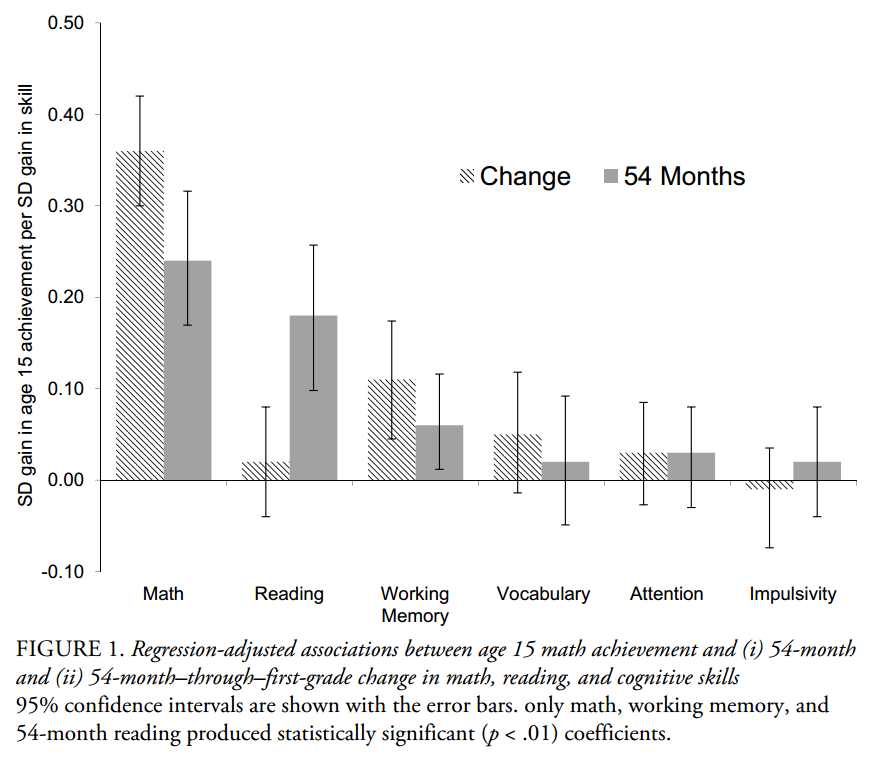When Should We Begin Developing Grit?
How a person becomes successful is now widely attributed to a sustained passion to practice and learn. Angela Duckworth at the University of Pennsylvania has examined this psychological trait called grit. It is indeed comforting to find out that success is not so much about genes but more on deliberate practice. Still, it is very unlikely that I would become a world champion in tennis at this point even with endless hours and days of practice on the court. There is such a thing as "too late". After all, development does occur in stages. Each stage takes time and there is no shortcut from beginner to expert. Talent may be overrated but an individual's current skills should not be dismissed. What we are today often offers a good glimpse on what we would be tomorrow. Our achievements in the early years therefore have predictive power. And proficiency in mathematics is no exception.
Watts and coworkers have recently demonstrated how mathematical skills at 54 months are correlated with mathematics achievement in high school (age 15) in a paper published in Educational Researcher. The article, "What’s Past Is Prologue: Relations Between Early Mathematics Knowledge and High School Achievement", relates the results of a longitudinal study involving more than 1000 children. These children were assessed at age 4 and a half years (54 months) on simple counting tasks and addition and subtraction. In addition, skills in reading, working memory, vocabulary, attention, and impulsivity were also measured at this time. These tests were also administered when these children were at first grade. At third and fifth grade, and at age 15, the children took grade-level standardized tests in mathematics. The results are summarized in the following figure:
The solid bars shown above provide the correlation between a child's skills at 54 months and the scores in a standardized high school-level math exam at age 15. Clearly, how a child does at 54 months is strongly correlated with math achievement at age 15. Reading is likewise correlated. The above has already been corrected to remove other factors such as family background and home environment. The correlation becomes stronger if one looks at how much a child has improved upon starting school. The association between a child's math performance at age 15 with how much a child has improved in math upon entering first grade is now almost twice as strong. The other skills such as attention and impulsivity are not at all correlated with how well a child performs in math ten years later.
Proficiency in mathematics may not be decided at birth but it is clear that good preschool mathematics can predict future performance in math. This study offers strong support for providing quality math education in the early years. Grit works but it has prerequisites. What happens in the early years is important....
Watts and coworkers have recently demonstrated how mathematical skills at 54 months are correlated with mathematics achievement in high school (age 15) in a paper published in Educational Researcher. The article, "What’s Past Is Prologue: Relations Between Early Mathematics Knowledge and High School Achievement", relates the results of a longitudinal study involving more than 1000 children. These children were assessed at age 4 and a half years (54 months) on simple counting tasks and addition and subtraction. In addition, skills in reading, working memory, vocabulary, attention, and impulsivity were also measured at this time. These tests were also administered when these children were at first grade. At third and fifth grade, and at age 15, the children took grade-level standardized tests in mathematics. The results are summarized in the following figure:
 |
| Above figure copied from Educational Researcher |
Proficiency in mathematics may not be decided at birth but it is clear that good preschool mathematics can predict future performance in math. This study offers strong support for providing quality math education in the early years. Grit works but it has prerequisites. What happens in the early years is important....
Comments
Post a Comment